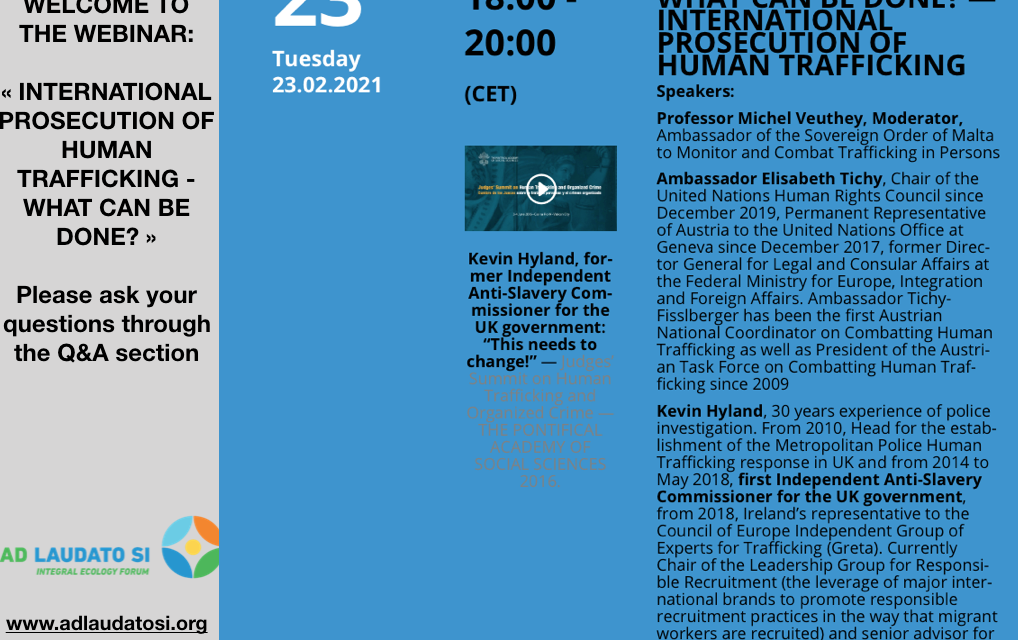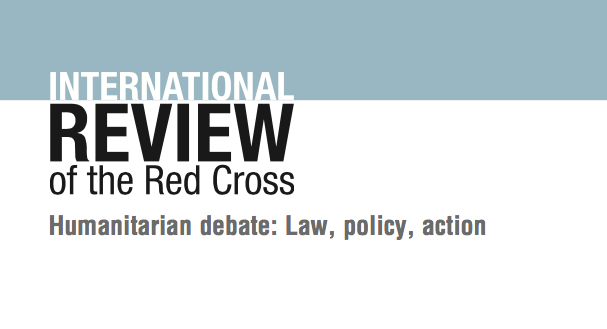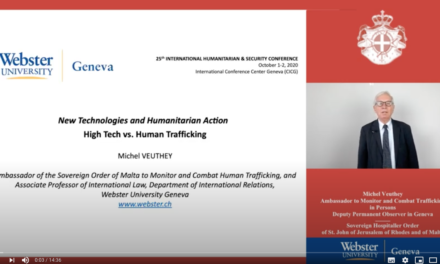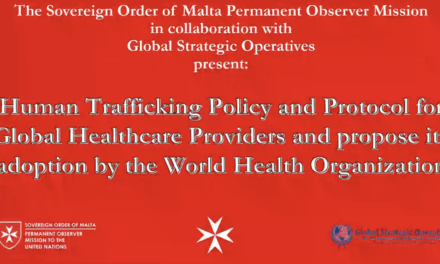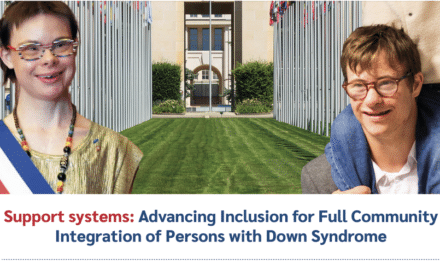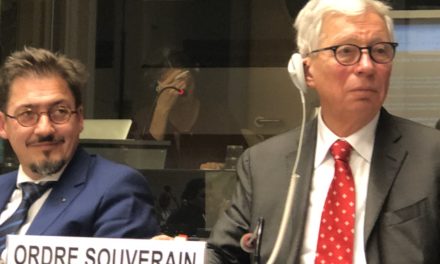Your are welcome to watch our second On-Demand Video Webinar on “International Prosecution Of Human Trafficking — What can be done?”.
The Ambassador of the Order of Malta to monitor and combat trafficking in persons organizes a series of 3 webinars on the international prosecution of human trafficking. This series of 3 webinars will assess the implementation of this treaty, raise awareness on the need to effectively prosecute traffickers, and promote action at the international, regional and national levels.
This webinar is the second of a series of three webinars :
- Where are we now?
- What can be done?
- Best Practices?
This webinar did focus on what can be done with a few very skilled and experienced presenters on this complex subject.
The webinar highlighted how difficult it is today to prosecute human trafficking criminals: according to Kevin Highland, first Independent Anti-Slavery Commissioner for the UK government, less than one in 1,250 trafficking cases is currently prosecuted. According to him, it is time to put in place at the international level, a plan on the same scale as the one being launched to fight global warming. Very few resources are devoted by governments to fight trafficking, which affects more than 45 million people worldwide.
Speakers:
Professor Michel Veuthey, Moderator, Ambassador of the Sovereign Order of Malta to Monitor and Combat Trafficking in Persons
Ambassador Elisabeth Tichy, Chair of the United Nations Human Rights Council since December 2019, Permanent Representative of Austria to the United Nations Office at Geneva since December 2017, former Director General for Legal and Consular Affairs at the Federal Ministry for Europe, Integration and Foreign Affairs. Ambassador Tichy-Fisslberger has been the first Austrian National Coordinator on Combatting Human Trafficking as well as President of the Austrian Task Force on Combatting Human Trafficking since 2009
Kevin Hyland, 30 years experience of police investigation. From 2010, Head for the establishment of the Metropolitan Police Human Trafficking response in UK and from 2014 to May 2018, first Independent Anti-Slavery Commissioner for the UK government, from 2018, Ireland’s representative to the Council of Europe Independent Group of Experts for Trafficking (Greta). Currently Chair of the Leadership Group for Responsible Recruitment (the leverage of major international brands to promote responsible recruitment practices in the way that migrant workers are recruited) and senior advisor for the Santa Marta Group (Church and Law Enforcement Combatting Modern Slavery)
Jennifer Richardson, Director of the Provincial Anti-Human Trafficking Coordination Office housed in the Ontario Ministry of Community and Social Services (MCSS, established to oversee and coordinate the implementation of Ontario’s Strategy to End Human Trafficking across government) — former HT victim
Peter Wiliams, Principal Advisor on Modern Slavery for International Justice Mission (IJM), leading IJM’s center of excellence in addressing slavery and developing globally applicable best practices from IJM’s extensive programmatic experience worldwide. Peter has ten years’ counter-slavery experience with IJM in the field, having led two IJM field offices in combatting modern slavery. Peter has a Ba/LLB(Hons) from the University of Auckland, New Zealand and began his career as a Crown Prosecutor in Auckland
Brian Iselin, former Australian soldier and federal agent, Founder of Geneva-based Slave Free Trade, a nonprofit working on leveraging the might of the blockchain to rid the world of slave labor
20 years after the adoption of the Palermo Protocol, this webinar addresses the questions and issues related to the implementation of this Protocol, and some of the best practices to prosecute human trafficking. The speakers offer different approaches and recommendations on how to combat the global problem of human trafficking and modern slavery.
Ambassador Elisabeth TICHY – FISSLBERGER
Using a case of human trafficking taking place through Latvia, Ireland and African countries, Ambassador Tichy-Fisslberger highlights the inherent complexity of the human trafficking phenomenon: the cases fall often under different laws, they have a transborder character, and are difficult to detect. However, the legal tools exist, what must be done better is the implementation of existing legal instruments, universal, regional and domestic. The Ambassador promotes a “whole society” approach, where different actors (e.g. Governments, health services, police) works, following the “4 P’s” of human trafficking: prevention, protection, prosecution and partnership.
Jennifer Richardson
Jennifer Richardson is the Director of the Ontario Provincial Anti-Trafficking Coordination Office, in Canada. Through her personal and professional experience of human trafficking, she presents here her work in the combat against human trafficking. The Ontario Anti-Human Trafficking Strategy 2020–2025 is Canada’s largest anti-trafficking strategy, that privileges a cross-governmental action plan focused on four areas: raising awareness, protect victims and early intervention, support survivors, and hold offenders accountable. A focus on the needs of Indigenous people is also an important component of this strategy.
Kevin Hyland, OBE
Kevin Hyland asks us to start acting on combatting human trafficking. We must focus on action and implementation of the legal tools we have, and not create new ones. All actors of society have a responsibility to act, be it Governments, law enforcement or civil society. The responses to human trafficking must be transparent and accountable, that is to say these responses must be honest and clearly defined. Kevin Hyland also highlights the importance of faith-based organizations (e.g. Santa Marta Group) in this combat, in establishing trust between the victims and the helpers, and ultimately with the authorities.
Peter Williams
Peter Williams brings us his first-hand experience, after having working on field programs of the International Justice Mission in Cambodia. Peter Williams stresses the importance of the first responder effect, particularly the quality of the first contact between the victims and the authorities. Indeed, this first approach is crucial in identifying a potential victim of human trafficking. Also, Peter Williams shows that excellent aftercare and recovery program for the victims is one of the greatest factors of success in the prosecution of human trafficking cases.
Brian Iselin
The founder of slavefreetrade advocates for a demand-oriented approach, instead of an over reliance on law enforcement. Indeed, supply is as good as infinite, but a reduction in demand can have considerable effects on the market. Prosecution of human trafficking is often not the best outcome, and should not be seen as the best option. Brian Iselin promotes the use of “RightsTech” in combatting modern slavery. “RightsTech” is a technology used for promoting, protecting, enabling and extending human rights. Through this, the businesses are incentivized to not exploit, as their bottom-line become dependent on their human rights performances.

